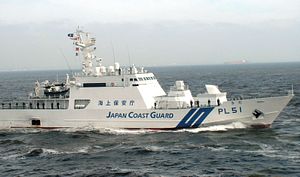The Japanese government is stepping up efforts to increase both its presence and the population’s awareness of claims to remote islands off the western coast of its main islands. The plans include the stationing of troops, increased investment in development, and the strengthening of “maritime education.” While these plans target islands from as far north as Hokkaido all the way south to Okinawa, they are still primarily concerned with exerting Japan’s claims to islands that are disputed with China.
The largest and most ambitious part of the plans announced this week is a bill the ruling Liberal Democratic Party is considering for this fall’s Diet session. According to the Yomiuri Shimbun, the plan intends to designate “about 10 inhabited remote islands near national borders as ‘special border remote islands’ to intensively promote the islands’ protection and development.” As noted above, the islands run the length of Japan’s west coast, and the bill seeks to assist islands that the government feels have been targeted by South Korean or Chinese entities in order to assert their claims or infringe on Japanese fishing rights. In light of these island’s dwindling populations (due to a lack of industry and connectivity to the home islands), the bill would increase government investment in ports, roads and infrastructure, as well as giving fishermen support “who suffer damage from illegal acts by foreign vessels.” More importantly, the plan also calls for the government to purchase property on these islands to be used by the Self-Defense Forces and coast guard as ports and airfields.
On Tuesday the Defense Ministry made requests to two separate mayors from Kagoshima prefecture to continue plans to establish a Ground SDF base on Amami-Oshima Island. According to the Kyodo News, both mayors intend to agree to the request, which would station roughly 550 troops as well as surface-to-ship and surface-to-air missiles on the island. The deployment to Amami-Oshima would be in tandem with government plans to station GSDF assets on Ishigakijima and Miyakojima as well, which are both little more than 200 km away from the disputed Senkaku/Diaoyu Islands.
On Wednesday, the Yomiuri Shimbun also reported that, in light of repeated Chinese incursions into the Japanese administered Senkaku Islands, the government aims to strengthen “maritime education” in public schools. The plan also intends “to enhance further [the] understanding of Japan’s sovereignty over territories, territorial waters and marine resources.” Even though this new curriculum would not be implemented until 2020, the government’s intention will likely garner a much quicker response from China.
Not only is the Japanese government renewing plans in place since last December to boost remote island defense, it is putting together what could easily become a comprehensive strategy to integrate not only those islands that are currently disputed with China, but other places like the Dokdo/Takeshima islets that South Korea also claims. This type of policy would be a logical next step, as the Japanese government moves forward with legislation either this fall or early next year to codify the Cabinet’s new interpretation of collective self-defense. The “special border remote islands” plan is a preemptive measure aimed at arresting both the slow decline of Japanese influence and forestalling any attempts to increase foreign assets by its neighbors.
Both South Korea and China can be expected to react unfavorably to these new policies, particularly after Japan’s latest charm offensive by top level officials like Foreign Minister Fumio Kishida in Myanmar with both of their foreign ministers, and Prime Minister Shinzo Abe’s repeated attempts to hold meetings with Chinese President Xi Jinping. Japan’s attempts to reset diplomatic ties are deeply incongruous with the specter of a fully normalized and robust Japanese military for these countries. Japan will have to find other areas in which to make significant concessions (such as a more comprehensive apology for its wartime atrocities along with reparations for its victims) if it is to begin persuading China and South Korea it is sincere in its statements that Japan seeks only to contribute to regional security and stability.

































